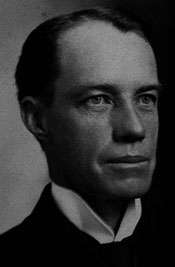Thomas Duckett Boyd
Thomas Duckett Boyd, Sr. (January 20, 1854 – November 2, 1932), was an American educator who was from 1896 to 1926 the president of Louisiana State University in Baton Rouge, Louisiana. Earlier, from 1888 to 1896, he headed Northwestern State University, then known as Louisiana Normal, a teacher-training institute in Natchitoches.
Thomas Duckett Boyd, Sr. | |
|---|---|
 Boyd as LSU president after 1900 | |
| Born | January 20, 1854 Wytheville, Wythe County, Virginia, USA |
| Died | November 2, 1932 (aged 78) |
| Resting place | Magnolia Cemetery in Baton Rouge |
| Nationality | American |
| Alma mater | Louisiana State University |
| Occupation | Educator President of Northwestern State University at Natchitoches |
| Spouse(s) | Annie Foules Fuqua Boyd (married, 1882-1931, her death) |
| Children | Thomas Duckett Boyd, Jr. David French Boyd Annie Foules Boyd Grayson Minerva French Boyd Howell Henry Cecil Boyd Agnes Scott Boyd Pitcher |
| Parent(s) | Thomas J. and Minerva A. French Boyd |
| Relatives | David French Boyd (brother) |
Biography
Boyd was born in Wytheville, Virginia, a son of Thomas J. Boyd and the former Minerva A. French. He was privately educated at the Howard Shriver school in Wytheville and in 1872 received his bachelor's degrees from LSU. After a year of legal studies, he was named in 1874 adjunct professor of mathematics at LSU. In 1875, he was elected Commandant of Cadets by the LSU Board of Supervisors. He was a professor of English and later history and English literature. He was an interim LSU president in 1886, two years before he relocated to Natchitoches to head Northwestern State University. He returned to LSU as president in 1896 and remained in that position for the remaining thirty years of his long academic career.[1]
At LSU, Boyd created the Louisiana State University Law Center and the Department of Education. He reorganized departments into colleges and supported agricultural programs. He arranged for permanent university funding through taxation. In 1904, he opened LSU to women. To encourage professional educators and based on his experiences at Northwestern State University, he organized teacher training institutes. He worked for successful passage of legislation guaranteeing public schools a stream of state funding.[1]
Boyd was a founder of the Louisiana Chautauqua, an educational lecture series, also supported by such figures as the historian Henry E. Chambers and John Keeny, the early 20th century president of Louisiana Tech University in Ruston. From 1919 to 1920, Boyd was the president of the National Association of State Universities. From 1921 to 1922, he headed the National Association of Land Grant Colleges. He was an organizer of the Louisiana Education Association. Boyd received an honorary degree from Tulane University in New Orleans.[1]
Boyd's time as LSU president paralleled the peak of the post-Civil War mythology of The Lost Cause of the Confederacy. Boyd's older brother, David French Boyd, was a Confederate officer who had served on the original LSU faculty when the school was based in Pineville in Rapides Parish in Central Louisiana and under the first LSU president and subsequent Union Army General William Tecumseh Sherman. David Boyd was the first LSU president at the time his brother Thomas began his own long-term association with the institution. Since its creation in 1953, the Boyd Professorship at LSU, named for both David French Boyd and Thomas Duckett Boyd, has honored sixty-five scholars in various fields of study.[2] After Thomas Boyd's presidency, the Boyd Professor of History T. Harry Williams did much to debunk the premises and defenders of The Lost Cause.[3]
In 1882, Boyd wed the former Annie Foules Fuqua of Baton Rouge, and the couple had five children: Thomas Duckett Boyd, Jr. (1882-1964), David French Boyd, II (1884-1885), Jeannette Foules Boyd (1886-1887), Minerva French Boyd Howell (1888-1973), and Henry Cecil Boyd (1895-1914), only two of whom lived past the age of twenty.[He also had another child, Agnes Scott Boyd, born 26 of Oct 1896, who married James Pitcher and lived in Minden, Louisiana.
[4][5] At the time of his death, Boyd was the LSU president-emeritus.[6] Mrs. Boyd died a year and a half before the passing of her husband in Baton Rouge. The Boyds and all of their children are interred at Magnolia Cemetery in Baton Rouge.[7]
In 1935, Marcus Manley Wilkerson published through the Louisiana State University Press Thomas Duckett Boyd: The Story of a Southern Educator.[8] Thomas D. Boyd Hall, the LSU administrative building, is named in his honor.[9]
References
- John F. Ohles, ed. (1978). Biographical Dictionary of American Educators, Vol. I. Westport, Connecticut: Greenwood Publishers. p. 156. ISBN 0-8371-9893-3. Retrieved October 24, 2014.CS1 maint: extra text: authors list (link)
- "Louisiana - LSU - Boyd professors". wikispaces.com. Retrieved October 23, 2014.
- Harold B. McSween. "T. Harry Williams: A Remembrance". Virginia Quarterly Review: A National Journal of Literature & Discussion. Retrieved July 13, 2009.
- "Thomas Duckett Boyd", Who's Who in the World, 1912
- "Thomas Duckett Boyd family papers, 1860-1966". worldcat.org. Retrieved October 24, 2014.
- "THOMAS DUCKETT BOYD.; President-Emeritus of Louisiana State University Dies at 78". The New York Times. November 3, 1932. p. 24 of Amusements/Art. Retrieved October 23, 2014.
- "Col. Thomas Duckett Boyd, Sr". findagrave.com. Retrieved October 24, 2014.
- Thomas Duckett Boyd: The Story of a Southern Educator. Baton Rouge, Louisiana: Louisiana State University Press. 1935. p. 374. Retrieved October 24, 2014.
- "LSU - Thomas D. Boyd Hall". foursquare.com. Retrieved October 23, 2014.